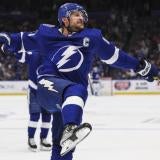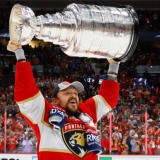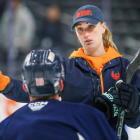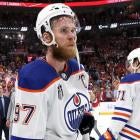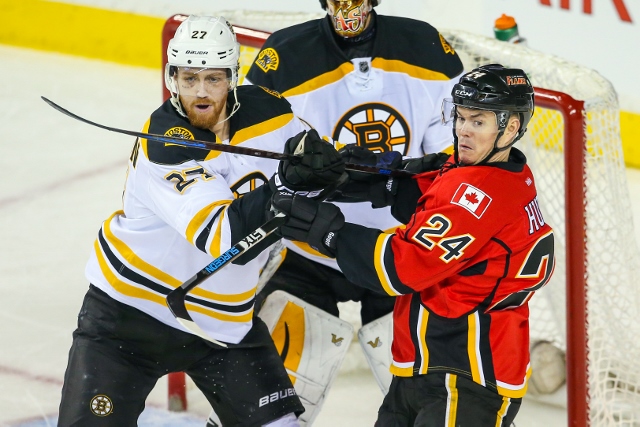
After a wild 2014-15 season in the Pacific Division, 2015-16 could be even wilder as each team has been quite busy this offseason and you can say with some confidence that six of the seven teams are better on paper than they were last season.
After missing the playoffs last year, the Los Angeles Kings and San Jose Sharks made some significant moves to try to shift the balance of power back to them again. However, 2014-15 darling Calgary also made some significant moves to build off of their playoff season instead of resting on their laurels. Even the lowly Arizona Coyotes and Edmonton Oilers managed to have successful summers. Really, it was only the Vancouver Canucks that appear to have taken a few lateral steps while the rest of the division arms up around them.
The Pacific Division appears poised to be far more entertaining and competitive than it was last season, making the Western Conference as a whole even tougher.
Here’s a look at which teams in the Pacific really improved with their summer moves.
| Team | Grades | Analysis |
|---|---|---|
 |
B- | Ducks analysis: It's been a pretty summer for GM Bob Murray as Anaheim looks to build off of a third consecutive Pacific Division title and a trip to the Western Conference title. The team's biggest addition was Carl Hagelin in a trade with the Rangers. They also brought in veteran D Kevin Bieksa and forwards Shawn Horcoff and Chris Stewart. A little more questionable was the extensions granted to Bieksa and Kesler, both high-risk deals due to the term and age of the players. The Ducks also still have to re-sign Hagelin and Jakob Silfverberg before their summer work is done. |
 |
B | Coyotes analysis: The Coyotes were in an awful situation earlier this summer due to the city trying to void their arena lease. However, amid the turmoil, GM Don Maloney was able to re-acquire free agents Antoine Vermette and Zbynek Michalek on reasonable deals (after trading them away for first-round picks last season). Arizona also had a phenomenal draft led by No. 3 pick Dylan Strome. Other, less impactful additions include Steve Downie, John Scott and Anders Lindback. They're still fully in rebuild-mode right now, but they made the most of a bad situation this summer. |
 |
A | Flames analysis: The front office could have easily said they were comfortable with the team they had after last season's surprise playoff run, but they didn't. The Flames gave up only draft picks to bring in Dougie Hamilton and signed him to a solid long-term extension. They also went out and got Michael Frolik, a terrific two-way winger, in free agency. They spent a little more than they should've probably, but he'll help right away. The biggest job the Flames have left is to get Mark Giordano re-signed. There are a lot of expiring contracts after this season (Sean Monahan and Johnny Gaudreau among them), but the Flames did what they had to do this summer to stay competitive next season. |
 |
B+ | Oilers analysis: Drafting Connor McDavid sure helps improve a team's prospects going forward. But the Oilers didn't stop there. They went out and picked up one of the top UFA defensemen in Andrej Sekera and nabbed a solid depth addition in Mark Letestu. Edmonton addressed their goaltending by adding Cam Talbot, but he's still unproven as a No. 1, so that move is not without risk. Adding McDavid to their young core of forwards very well could change everything. Even though we've been expecting the Oilers to break out year after year, McDavid may have been the missing link. Adding Peter Chiarelli as GM and Todd McLellan as head coach should be upgrades in both positions as well. |
 |
B | Kings analysis: It's been a tumultous summer in Los Angeles. First pending UFA Jarret Stoll got arrested, Mike Richards had his contract terminated under mysterious circumstances and Slava Voynov pleaded no contest to a domestic violence charge and is currently in jail. Other than that, Mr. Lombardi, how was your summer? On the hockey side of things, it ended up going pretty well. The Kings managed to bring in Milan Lucic, who should add a different element to the team. They did end up losing Justin Williams in the process, but Lucic is a bit younger and will provide a more physical element to the Kings' lineup while bringing some additional scoring pop. Also, the club signed Tyler Toffoli to a new cap-friendly bridge deal. They still need to figure out how to re-sign Anze Kopitar, though. |
 |
B+ | Sharks analysis: After a bizarre season, the Sharks look a little more settled. They parted ways with coach Todd McLellan and brought in Peter DeBoer, who would appear to be a much different voice behind the bench. On top of that, the Sharks were aggressive this summer. They signed UFA D Paul Martin to a really nice contract, traded for goalie Martin Jones, who could be their starter next season and a cheap one at that. Additionally, the team improved forward depth by bringing in Joel Ward on a pretty reasonable deal. They're betting on Jones, who is unproven as a No. 1, but if he pans out, San Jose is in really good shape heading into the season. |
 |
D+ | Canucks analysis: I know I'm not the only one puzzled by what's going on in Vancouver. They seem to be in a weird "rebuild, or not to rebuild?" limbo. It's not a good place to be. They shipped out popular goalie Eddie Lack for a minimal return, traded veteran D Kevin Bieksa, swapped Zack Kassian for the older Brandon Prust, and then sent a pretty decent package to the Penguins for Brandon Sutter. Are the Canucks better as a whole heading into next season? Sure doesn't look like it. That is, unless Ryan Miller somehow returns to form at 36 years old. Unrest in Vancouver is only growing after what's gone on this summer. |
Best move: Calgary Flames acquire Dougie Hamilton from Boston Bruins for a first-round pick and two second-round selections
The aggressive Flames surprised the hockey world with their incredible 2014-15 season, but kept the surprises coming this summer by going out and getting Hamilton. Calgary’s defense was already pretty good to begin with, but adding Hamilton to the mix takes it to an entirely new level.
The Flames now have a legit No. 1 defenseman in Mark Giordano, and both T.J. Brodie and Dougie Hamilton have No. 1 potential. Then you look at the production Dennis Wideman enjoyed last year, and you’ve got yourself a heck of a top-four.
What was especially important is that the Flames also had to re-sign Hamilton, doing so with a six-year, $34.5 million contract. The 22-year-old's (22!) $5.75 million annual cap hit through 2020-21 is only going to look better as he moves forward in his career. The other added benefit is that if the Flames can’t get Giordano re-signed, they have two built-in heirs in Hamilton and Brodie. There’s some protection, even though keeping Giordano would be preferred.
The fact that the Flames didn’t have to give up anything off of their current roster to make the deal happen makes it even more of a home run for GM Brad Treliving.
Worst move: Vancouver Canucks acquire Brandon Sutter and a third-round pick from the Pittsburgh Penguins for Nick Bonino, Adam Clendening and a second-round pick
There were a few questionable moves in the division this summer, a few of them from Vancouver alone, but this one stands out a bit. Brandon Sutter is a fine player and his role with the Canucks should make him more productive, but it’s how the deal came together that is particularly puzzling.
First off, GM Jim Benning noted that it was Penguins GM Jim Rutherford that approached him about trading Sutter. The Pens needed to unload his $3.3 million cap hit, which should have given the Canucks some leverage. Instead, Vancouver ended up sending Nick Bonino and his extremely cap-friendly contract, a strong defensive prospect in Adam Clendening and a second-round pick for good measure.
Sutter brings more grit, but Bonino provides more skill and has had two seasons over or near 40 points at a $1.9 million cap hit. Not only that, but the Canucks view Sutter as a foundational player and plan to give him a long-term extension.
Sutter’s career-best is 40 points in a season. He has 185 points in 495 NHL games at 26 years old. Not sure that screams “foundational.”
Most improved team: Edmonton Oilers
All they had to do was draft Connor McDavid to earn this distinction. If he meets all of the expectations placed upon him and has a Sidney Crosby-like impact on Edmonton over these next few years, Edmonton could finally pull themselves out of laughing-stock territory.
It’s not just about McDavid, though. The Oilers overhauled their front office, inserting Bob Nicholson as president, Peter Chiarelli as GM and Todd McLellan as head coach. That right there helps provide the culture change this team so sorely needed after years of inept leadership.
On top of that, the Oilers made a significant improvement on defense with the addition of Andrej Sekera and also decided to take a chance on Cam Talbot. The Oilers now have two guys that have spent the bulk of their NHL careers as backup competing for their starting job, with Talbot expected to hold the upper hand.
It’s going to be interesting to see how different the Oilers are in Year 1 of the McDavid era and where they’ll go from here.
Least improved team: Vancouver Canucks
While the rest of the division made additions and upgrades, it seemed like the Canucks did the opposite. It’s been a confusing offseason in Vancouver as there is no clear evidence that there’s any sort of vision of where this team is going.
As our Adam Gretz recently wrote, it seems like the Canucks are somewhere between “going for it” and rebuilding. That’s usually a bad spot to be in.
The club traded away the more productive Eddie Lack instead of the more expensive Ryan Miller, who apparently drew interest by Jim Benning’s own admission. They did the right thing in trading Kevin Bieksa, a veteran in decline, but then used the second-round pick acquired in that trade to help bring in Brandon Sutter on an over-paying package. Benning also traded Zack Kassian for the older, more expensive and less productive Brandon Prust.
After reaching the playoffs last season, the Canucks clearly still needed work to do, but it’s hard to figure out exactly what’s going on in Vancouver right now.





